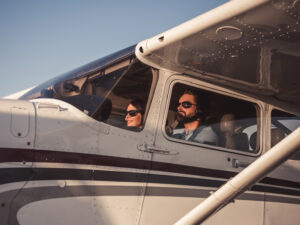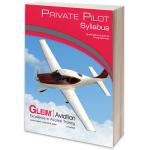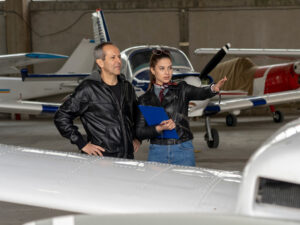 Flight students and instructors have a unique professional relationship. Because flight instructors and students spend the majority of their time 1-on-1, they need to cultivate courteous, professional relationships that will help students reach their learning goals. Anything less than professional conduct can impede learning and lead to an unproductive working relationship. Though individual students and instructors may relate to each other very differently, both parties have a responsibility to treat each other with respect. With that in mind, here are 5 simple tips that both students and instructors should follow in order to have a healthy professional relationship.
Flight students and instructors have a unique professional relationship. Because flight instructors and students spend the majority of their time 1-on-1, they need to cultivate courteous, professional relationships that will help students reach their learning goals. Anything less than professional conduct can impede learning and lead to an unproductive working relationship. Though individual students and instructors may relate to each other very differently, both parties have a responsibility to treat each other with respect. With that in mind, here are 5 simple tips that both students and instructors should follow in order to have a healthy professional relationship.
1. Be on time.
Being consistently late for appointments can quickly sour any professional relationship. Chronic tardiness and frequent cancellations can quickly cause a student to lose respect for an instructor or an instructor to become frustrated with a student, especially in 1-on-1 situations like flight instruction.
Students: Do your best to arrive early and ready to meet with your instructor, as this is what will be expected of you later on in your career.
Instructors: Remember that students are paying for you to arrive when scheduled. Their time is just as important as yours.
2. Be prepared.
Showing up for a lesson unprepared is another common time waster that can negatively impact the student/instructor relationship.
Students: If you want to maximize your learning and earn your instructor’s respect, you need to prepare for the lesson beforehand. Preparation can include activities such as reviewing weather information, calculating weight and balance and performance, completing your flight plan and navigation log, and making sure you have all necessary supplies, current charts, and fully charged electronics.
Instructors: Your first question when you see your student should not be “So, what do you want to do today?” Instead, you should have a structured lesson and curriculum that you have planned and discussed with the student ahead of time. For  each meeting, you need to review the day’s lesson, along with previous lesson activities and notes, and be prepared to teach the content to a student. Pre- and post-flight briefings can be some of the most valuable times for instruction.
each meeting, you need to review the day’s lesson, along with previous lesson activities and notes, and be prepared to teach the content to a student. Pre- and post-flight briefings can be some of the most valuable times for instruction.
Need help planning lessons? Check out the Gleim pilot training syllabus.
Need help tracking activities? Check out the Gleim training records.
3. Be a good listener.
Good communication may be the most vital component of any successful relationship, whether personal or professional. However, communication cannot exist without active listening, which is especially critical in aviation, where students’ and instructors’ lives can depend on communicating effectively. Almost every instructor can remember a time when a student made an error because they weren’t properly tuned into the instructor’s lesson.
 Students: Make your instructor’s job easier by listening carefully and trying your best to follow their instructions. Studying and preparing adequately beforehand will improve your listening skills and enable you to perform even more successfully when learning new concepts. By taking notes during your lesson debrief, you can review them before the next flight and have your instructor’s pointers fresh in your mind. Finally, don’t be afraid to ask questions. Instructors want to teach and genuinely love the challenges involved with helping students understand new concepts.
Students: Make your instructor’s job easier by listening carefully and trying your best to follow their instructions. Studying and preparing adequately beforehand will improve your listening skills and enable you to perform even more successfully when learning new concepts. By taking notes during your lesson debrief, you can review them before the next flight and have your instructor’s pointers fresh in your mind. Finally, don’t be afraid to ask questions. Instructors want to teach and genuinely love the challenges involved with helping students understand new concepts.
Instructors: You must also be good listeners in order to help your students learn effectively. Actively listen not just to what students are saying but also to what they are not saying. Sometimes a student may struggle with a topic but cannot clearly express what the problem is based on their limited understanding. Instructors need to listen patiently to the student and discern how to best help them.
4. Don’t be afraid to speak up.
Open dialogue is the key to improving any relationship, especially when one or both parties want to learn or communicate more effectively. Students can get frustrated when an instructor does not thoroughly debrief them or give clear feedback on how the student is progressing. Instructors need to inform students of exactly what they are doing wrong and how to properly correct it, or else progress will stagnate. However, instructors are not perfect either. At times, students may need to speak up and specifically ask the instructor for feedback.
Similarly, any sort of unresolved or unaddressed conflict can greatly reduce the effectiveness of the training. Whether it is the instructor or the student, someone should take the initiative and do whatever it takes to end the conflict so training can continue productively.
Instructors: Don’t forget to also give credit where it is due. Students need to be recognized for their accomplishments.
5. Remember flying is fun!
Remember that learning to fly should be a fun experience. Although safety and procedures need to be taken seriously, do not forget to enjoy the wonder of flight.
Instructors: Remember that if you are unenthusiastic as you present material to your students, they will probably not be very excited either. Keep training fun and mix things up to prevent monotony.
Students: If you find yourself stressed out about meeting standards, passing check rides, and perfecting your technique, take a moment to look out the window and enjoy the view. Students and instructors who adopt this attitude will find flying more enjoyable and will also have a healthier, more productive, and more satisfying professional relationship with each other.


